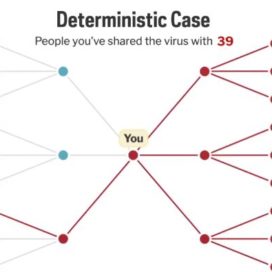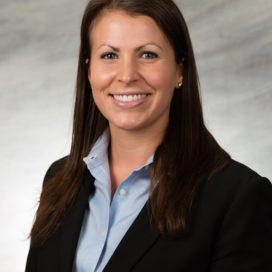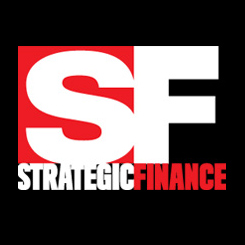News
-
 Most firms neglected to include pandemic in annual risk assessments despite warning signs, study shows
Most firms neglected to include pandemic in annual risk assessments despite warning signs, study showsFinance professors Bill McDonald and Timothy Loughran examined all 10-K filings (annual reports filed with the Securities and Exchange Commission) from 2018, before the current pandemic, and found that less than 21 percent of the filings contain any pandemic-related terms.
Shannon Roddel -
 Econometrics researcher’s calculations illustrate why we should social distance
Econometrics researcher’s calculations illustrate why we should social distanceNot only does social distancing work to slow the spread of the virus, it’s an exercise in probability, according to Richard Sheehan, finance professor at the University of Notre Dame’s Mendoza College of Business. Sheehan, who specializes in applied econometrics, has developed a model that shows viral transmission as a probability rather than a certainty and demonstrates how social distancing — or changing the probabilities — slows the spread.
Shannon Roddel -
 “Phase Four” coronavirus relief package is necessary and must address three points, expert says
“Phase Four” coronavirus relief package is necessary and must address three points, expert saysJeffrey Bergstrand, professor of finance and a former Federal Reserve economist, emphasized the need for Phase Four, which he said “will bring some stimulus to aggregate demand if there is a government infrastructure program put in place.”
Shannon Roddel -
 Female directors are quicker to recall dangerous medical products, study shows
Female directors are quicker to recall dangerous medical products, study showsSevere product problems that injure or kill consumers are recalled much faster when there are women on the board according to “The Influence of Female Directors on Product Recall Decisions,” forthcoming at Manufacturing & Service Operations Management from lead author Kaitlin Wowak, assistant professor of information technology, analytics and operations in Notre Dame’s Mendoza College of Business.
Shannon Roddel -
 Coronavirus relief dollars will help produce medical supplies, direct patient impact will take time
Coronavirus relief dollars will help produce medical supplies, direct patient impact will take timeA $2 trillion coronavirus relief package is on its way, but health care workers won’t feel its impact for weeks, according to Kaitlin Wowak, an assistant professor of IT, analytics, and operations at Mendoza College of Business.
Shannon Roddel -
Trusting strangers: Details matter to millennials using Uber, Airbnb
The “sharing economy” is a defining feature of the millennial generation, allowing people to earn money from renting their assets that may be sitting unused, including homes, spare bedrooms and […]
Shannon Roddel -
 When less (frequent) is more
When less (frequent) is moreAccountancy professor F. Asís Martínez-Jerez and his co-researchers explain their pilot project, revealing that the best performance is achieved when detailed feedback is delivered less frequently, in a piece for Strategic Finance.
Strategic Finance -
 On the Money
On the MoneyResearchers build the first analytical model to study selling virtual video game currency. Business analytics professor Hong Guo, grew up playing video games in China and has studied emerging IT trends ranging from net neutrality to mobile platforms since earning her doctoral degree. Her latest research is the first to build an analytical model to understand the trend sweeping the video game world of selling virtual currency.
Brendan O'Shaughnessy (ND '93) -
 Contract Killers
Contract KillersDetailed contracts can provide incentives for opportunistic behavior. In a rapidly changing business landscape, are incomplete contracts the answer? Accountancy professor F. Asís Martínez-Jerez believes there is a counterintuitive solution.
Michael Hardy -
 Building an ethical career
Building an ethical careerAnn Tenbrunsel's research into the ethical mirage, which is the tendency to overestimate the virtuousness of our future selves, was used in a piece by Harvard Business Review about being intentionally ethical in your career.
Harvard Business Review
